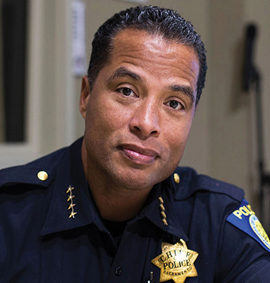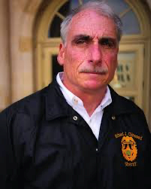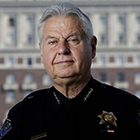Contact Us
To provide feedback on the Community Policing Dispatch, e-mail the editorial board at CPDispatch@usdoj.gov.
To obtain details on COPS Office programs, publications, and resources, contact the COPS Office Response Center at 800-421-6770 or AskCopsRC@usdoj.gov

U.S. Department of Justice
Office of Community Oriented Policing Services
Washington, DC 20530
 “I had absolutely no desire, nor did I ever even think about being a police officer growing up. I witnessed my first murder when I was nine. I was arrested by the Sacramento Police Department for assault on an officer when I was 16.”
“I had absolutely no desire, nor did I ever even think about being a police officer growing up. I witnessed my first murder when I was nine. I was arrested by the Sacramento Police Department for assault on an officer when I was 16.”
Those were words shared by retired Sacramento Police Chief Daniel Hahn during a recent episode of the COPS Office podcast series, The Beat. It is therefore ironic that this native son of Sacramento ended up as the chief executive of that city’s police department. It is also fortunate for the people of Sacramento that Hahn was able to apply his innate understanding of the city and his lived experiences as he led the department and community through the challenge of coming together in the aftermath of a high-profile police-involved shooting.
Hahn, like many chiefs, has had to navigate the seemingly impossible task of balancing the needs and demands of a community with those of officers in his department as well as the expectations of the national public—who, by virtue of incessant media coverage of the incident, were monitoring developments with fervor. First-line supervisors, commanders, deputy chiefs, and those wearing their departments’ highest ranks can all attest to the loneliness of leadership. Leaders, while often surrounded by people, bear the ultimate burden and responsibility for decisions, outcomes, and consequences. It can be a complicated space in which to exist, particularly when change is called for, but there is no agreement on what those changes should be.
During the podcast, Chief Hahn discusses growing up in a neighborhood viewed as a high crime area, lessons of community service taught to him by his adoptive mother, his journey through a career in law enforcement, and the need for collective understanding of how law enforcement and low-income communities can move forward together.
Listen to Chief Hahn’s interview with The Beat.
Additional Episodes in the “Profiles in Law Enforcement Leadership” Series

Mike Chitwood – A Profile in Law Enforcement Leadership
At heart, Mike Chitwood is a hard-charging cop who got his start chasing criminals through Philadelphia’s subway system and now serves as the elected sheriff of Volusia County, Florida. He is a dichotomy, viewed equally as a reformer and someone whose style and results endear him to traditionalists. Sheriff Chitwood joins The Beat to discuss his unyielding approach toward fighting crime, strategic improvements being implemented in his agency, effective community engagement, and contemporary issues in policing.

Kathleen O’Toole – A Profile in Law Enforcement Leadership
Kathleen O’Toole worked her way through the ranks to become arguably the most experienced woman in the history of American policing. She has served as the chief of the Seattle (Washington) Police Department, Commissioner of the Boston (Massachusetts) Police Department, Lieutenant Colonel of Massachusetts State Police, Secretary of Public Safety for the State of Massachusetts, and Chief Inspector of Ireland’s National Police Service. Chief O’Toole (ret.) joins The Beat to share her experiences and discuss current law enforcement issues.

Chuck Jordan – A Profile in Law Enforcement Leadership
Chuck Jordan retired as the chief of the Tulsa (Oklahoma) Police Department in 2019, and during his 50-year career he made quite a mark on the profession. From his very first day on the job when he responded to an armed robbery call, to serving as a commander of the United Nations Civilian Police Mission in war-torn Kosovo, Jordan has seen a lot. As the chief in Tulsa, a city with a well-documented history of trauma stemming from the 1921 Black Wall Street Massacre, Jordan led his department’s response to a high-profile police-involved shooting and a racially motivated spree of shootings that threatened to reopen wounds that were almost a century old. Whether you are a patrol officer, supervisor, or executive, Chief Jordan’s conversation with The Beat offers insight into contemporary issues in policing that should not be missed.
Subscribe to Email Updates
To sign up for monthly updates or to access your subscriber preferences, please enter your email address in the Subscribe box.






